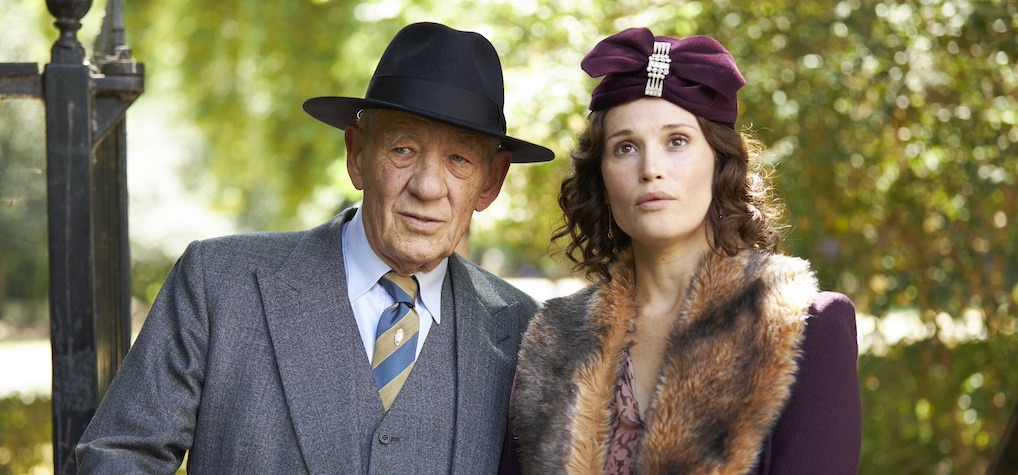
‘The Critic’ // BKStudios
‘The Critic’ is instructive.
The stakes are low and the thrills are few in Anand Tucker’s ‘The Critic’, which is best described as a suspense film for people who dislike suspense, and a black comedy for those who prefer their humor a light gray.
After forty minutes of exposition, the story actually begins: an old theater critic (Ian McKellen) enlists a failed actress (Gemma Arterton) to seduce his new boss (Mark Strong). Why? He wants to keep his job. Things soon, as you can probably guess, go wrong.
The film fails not necessarily by my standards, but by the director’s. In a statement, Tucker describes the film “as a meditation on the entire experience of being human, with all our flaws, our terrible choices and their consequences on display”. There are indeed some terrible choices on display, but unfortunately their consequences are mostly felt on our side of the screen.
One such choice is to make a “mediation on the entire experience of being human”, which is really a self-defeating remark. It is often said that it is in the particular we find the universal- and film is the medium of the particular. No movie could ever reflect “the entire experience of being human”, because a) There’s no such thing and b) The directness of the medium is ill-suited for such vague notions.
If the director is selling an odyssey into the darkest recesses of the human soul, the producers are selling something else entirely: Sir Ian McKellen. All the marketing revolves around his star power- and rightfully so. He is the film’s best asset and sinks his teeth into the anti-hero role all actors love to play. He is clearly enjoying himself, perhaps a bit too much, and since the role is a cliche at its core (the critic-with-a-heart-of-coal), it isn’t destined for greatness.
But just to give you an example of what a good actor can do with an ordinary part, there is a scene when he is on the phone and says “I never lie” as he strokes his nose- a clear sign he is lying. This gesture comes from either two approaches: a) McKellen is aware of how his actions are perceived and is trying to tell the audience something, or b) he is unaware of his actions and is so involved in his character that he displays real behavioral traits. I can’t say for certain which approach Sir Ian uses (one hopes it is the latter), but in any case, it works.
Despite the director’s lofty ambitions and the performer’s innate talent, the film fails as art. But how does it fare as entertainment? Not much better. Britain has a legacy of talented thriller directors, from Michael Powell (‘Peeping Tom’) to J. Lee Thompson ( ‘Cape Fear’), to Alfred Hitchcock. The British sense of humor has proven ideal for the thriller since both suspense and comedy depend on anticipation and surprise, and the genre is best when both elements are blended (for a superior example, see Kind Hearts and Coronets, or nearly anything by Hitchcock).
What is expected from a thriller is not high art, but suspense: we must care about the protagonist, they must be put in peril, and they must confront a formidable foe. It is enough for the director to hit his marks and go home. This is where ‘The Critic’ fails most; it’s a suspense film without suspense, which I guess is some kind of innovation.
Since form and content are bound together (more than some would like to admit) the style suffers from the same flaws as the substance. The lighting, for instance, is cinematic, in the way you’d expect those who describe things as ‘cinematic’ would make it. Critics and filmmakers use the phrase often, but there is no such thing as cinematic lighting. There are many different ways to light a frame, all of which have their use. But the current school of thought (or lack thereof) considers polished lighting and contrasty colors the ultimate in filmic style. This philosophy is closer to that of postcard manufacturers and advertisers than artists; it sells an image of a thing rather than the thing itself. This vulgar aestheticism is a barrier because the imagery is made to be looked at, whereas the audience demands images that can be looked into. Cinema has many functions, and one of the main ones is to allow the audience to enter a time and space different from their own. Unfortunately, ‘The Critic’, and many other films like it, deny us this luxury.
Yet another barrier to the audience is the wall-to-wall soundtrack, which tries to force an emotion upon the audience. It is manipulative but not effective. Through 130 years of watching films, we have been conditioned to know that sad music indicates sadness, happy music indicates joy and scary music…you get the idea. Since then, directors and composers have used this to their advantage, either contributing to the classical canon with distinct and moving scores (like ‘Spellbound’) or inverting this expectation (Martin Scorsese’s use of ‘Please Mr Postman’ for a fight scene in ‘Mean Streets’). But the score for ‘The Critic’ seems like it was plucked from the iMovie library, and is as blatantly manipulative as a soap opera soundtrack. It makes you wonder where the filmmakers have been for the last 130 years. Have they made a film before? Or even seen one?
In a similar vein, the camera work is uninspired. Like many modern films, the camera movements are too smooth and rapid. This is because cameras are lighter than they used to be, and cranes and dollies are now more sophisticated. However, the limitations of the older equipment also gave a sense of presence. Because the cameras were heavier and slower, they felt more human, becoming a third character in the scene, a stand-in for the audience. This can still be done with modern equipment, but it requires the realization that it doesn’t matter what equipment is used, but how.
And with film equipment as cheap and functional as ever, you’d think there would be more experimentation. But instead of using the tools as weapons, they are used for defense. It seems, at least for now, that technical innovation has stunted creativity. There is nothing around today like the opening of ‘Touch of Evil’ (1958), even though it would be easier and cheaper to do a shot like this now than it was back then.
A more crucial lesson Tucker et.al could have learned from Orson Welles was how to deal with the studios. When Universal took over the editing of ‘Touch of Evil’, he wrote a fifty-eight-page letter explaining why they shouldn’t. A similar situation arose last year when ‘The Critic’ debuted to a lukewarm reception at the Toronto Film Festival. The distributors ordered extensive reshoots, the filmmakers complied, and the film was re-released- to even more scathing reviews.
Now they didn’t have a masterpiece on their hands like Welles did, but I think the comparison draws out an interesting point. It’s easy to blame ‘the system’ for the state of modern films, but what about the artists? Are they not complicit? Jacques Rivette spoke of the need for a ‘spirit of poverty’ amongst French filmmakers in the 1950s. He was a critic before becoming a filmmaker, like his contemporaries Francois Truffaut, Jean-Luc Godard, Claude Chabrol, and Eric Rohmer. They then started the French New Wave, which influenced cinema everywhere. In other words, the artists spurred the industry to change, not the other way around.
The system in Hollywood and France in the 50s was unideal, just as it is now. It always has been. Cinema, from the very start, has been a commercial enterprise. The Lumiere Brothers, contrary to popular belief, did not invent cinema. The famed screening at The Grand Cafe in 1895 was not so much the arrival of an art form as the birth of a mass–entertainment medium. The Lumiere Brothers’ real innovation was projecting an image to a crowd (before them, films were more akin to peep-shows and kaleidoscopes). The profitable possibilities have since developed, and filmmakers, for better or worse, have worked inside and outside the system to express themselves through sight and sound.
So it’s pointless to blame the system for being what it is; however, we should expect more from those making films. Even if the system is worse than before (and maybe it is), who cares? Where will the change come from? Not from within, if we can heed the lessons of the French New Wave. The film industry is inherently reactionary; the system’s job is to follow trends, and the artist’s is to create them.
‘The Critic’ demonstrates everything wrong with the current approach to filmmaking. We should be grateful for this because knowing the problem is the first step to finding a solution.
‘The Critic’ is in cinemas from 3rd October.






